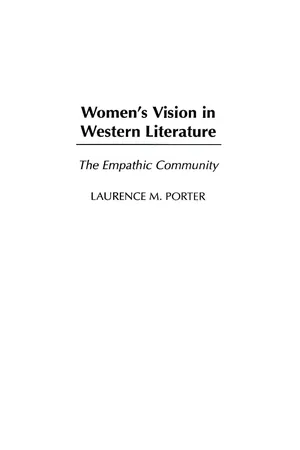
- 266 pages
- English
- PDF
- Available on iOS & Android
About this book
From ancient Greece through the present day, women writers have confronted the male urge to make war by imagining communities in which intuitive bonding among individuals questions and replaces masculinist values of aggression and competition. Women's Vision in Western Literature traces the gender gap in literature from 600 B.C. to the present day through an examination of seven extraordinary women writers from Sappho to Christa Wolf. Combining close readings with a comprehensive overview of the careers of these women, Porter shows how the threat, the experience, and the aftermath of war incites them to imagine tolerant, empathic communities. This careful consideration of these seven great writers brings to light an underappreciated aspect of Western women's writing. Starting with Sappho, Porter illustrates this ancient poet's ability to rewrite the Homeric war rhetoric to reflect a non-possessive love experience. Marie de France arranges traditional animal fables to imply an open-ended situation-ethics, according to the author, and Madame de Stael—in a Europe torn by Napoleonic conquests—advocates cross-cultural unions among countries. In the works of Mary Shelley, we see the warnings of the dangers of vainglorious, soulless technology, and Virginia Woolf depicts intuitive bonding beyond gender stereotypes, amid the ruins of war and crumbling empire. He shows how Marguerite Yourcenar dreams of a new era of world peace after Hitler's defeat, and how Christa Wolf tries to cope with her country's Nazi past even as she reaffirms European identity threatened by annihilations in nuclear conflict.
Frequently asked questions
- Essential is ideal for learners and professionals who enjoy exploring a wide range of subjects. Access the Essential Library with 800,000+ trusted titles and best-sellers across business, personal growth, and the humanities. Includes unlimited reading time and Standard Read Aloud voice.
- Complete: Perfect for advanced learners and researchers needing full, unrestricted access. Unlock 1.4M+ books across hundreds of subjects, including academic and specialized titles. The Complete Plan also includes advanced features like Premium Read Aloud and Research Assistant.
Please note we cannot support devices running on iOS 13 and Android 7 or earlier. Learn more about using the app.
Information
Table of contents
- Acknowledgments
- Introduction: Competitive and Cooperative Styles in Literature
- 1. Make Love, Not War: Sappho
- 2. The Situation Ethics of Marie de France
- 3. Styling a European Union: Madame de Staël
- 4. Sympathy for the Devil: Mary Shelley’s Frankenstein (1818)
- 5. Communion and Coercion in Virginia Woolf’s Mrs. Dalloway
- 6. The Peaceable Empire: Marguerite Yourcenar’s Mémoires d’Hadrien
- 7. Christa Wolf, Citizen of the World
- Conclusion: The Empathic Vision
- Notes
- Bibliography
- Index